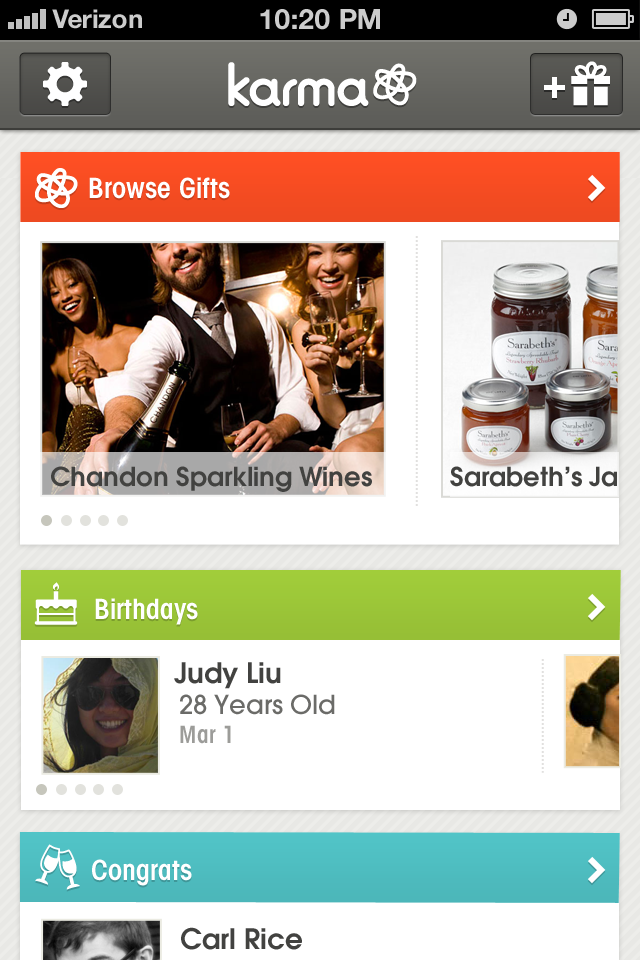
Like many San Francisco tech entrepreneurs, Lee Linden has his roots in the Midwest. While he’s spent the past few years chasing success on the West Coast, he’s struggled to maintain ties with the people who know him best.
In major cities across the world, this is an all-too-common story: Hometown boy leaves to make good in the big city, but loses touch with family and friends along the way.
To address this problem for himself and for others in the same scenario, Linden (who formerly founded smartphone startup Tapjoy) and his cohorts created Karma, a gorgeous mobile app that lets you show your friends you remember them and care about the milestones in their lives, no matter how much distance separates you.
 Karma lets you send appropriate and high-quality gifts to friends and family based on their life events. The app pulls in data from Facebook — not just gathering anniversary and birthday dates, but also picking up on subtler clues, such as a group of Timeline messages saying “I’m sorry” or “Congratulations.” Based on this data and demographic information, Karma helps you select the perfect gift, something not too ostentatious, but an item that will show you’re still connected and you care.
Karma lets you send appropriate and high-quality gifts to friends and family based on their life events. The app pulls in data from Facebook — not just gathering anniversary and birthday dates, but also picking up on subtler clues, such as a group of Timeline messages saying “I’m sorry” or “Congratulations.” Based on this data and demographic information, Karma helps you select the perfect gift, something not too ostentatious, but an item that will show you’re still connected and you care.
As Linden said in a visit to VentureBeat’s San Francisco office last week, “My friends and family are the most important components in my life. It’s not about spending a lot of money on them, it’s about showing them they’re in my thoughts.”
The young founder continued, “We got sick of missing all the important moments in their lives… all these fleeting moments added up in our minds, and Karma is our answer to that problem.”
The Karma app, which is available now for iPhone and Android and has a website coming soon, is a finely crafted solution, indeed. Linden said his team wrote a lot of semantic analysis software to analyze life events from Facebook, from births and engagements to job changes or personal losses.
The design of the app itself is masterful; it’s a joy to look at and a pleasure to use. But more important than the façade is the architecture of the content. Each gift you’ll find on Karma was hand-selected, tested by curators, and photographed and reviewed by the Karma team.
And these aren’t just your run-of-the-mill, go-to gifts, either. “We partnered with a lot of companies that are excited about making their products giftable,” said Linden. “For example, we partnered with Uber, and now you can send someone an Uber ride to the airport.”
In many ways, the gifting parts of the app reminded us a lot of Fab.com — a wide range of tasteful, beautifully designed, high-quality products that just about anyone would enjoy. And because the stock is all hand-picked and sorted for demographics and occasions, Linden noted, it removes a lot of the “analysis paralysis” that goes hand-in-hand with other online shopping experiences.
 Once you select a gift for a loved one in your Facebook or phone contacts lists, you can customize a digital card, which the recipient can receive via mobile SMS, email, or a Facebook message. This gift notification system means you don’t have to know the recipient’s physical address — an increasingly rare piece of information these days.
Once you select a gift for a loved one in your Facebook or phone contacts lists, you can customize a digital card, which the recipient can receive via mobile SMS, email, or a Facebook message. This gift notification system means you don’t have to know the recipient’s physical address — an increasingly rare piece of information these days.
The recipient enters his or her address to receive the beautifully gift-wrapped item within a few days. He or she can also exchange the gift for another item — no prices are show on the recipient-facing side of the app, of course.
The app is designed with a few thoughtful features, such as pre-scheduling gifts to be sent on future dates and allowing recipients to send thank-you cards to the gift giver. And if the recipient can also choose to donate the value of the gift to a charity in lieu of having a gift mailed.
From the business side, Karma works like any other store, buying products wholesale and marking them up for retail to turn a profit. Still, the retail prices are fair; you’d be hard-pressed to find a gift costing more than $50.
“For me, I live in a world where the people who are important to me aren’t right down the street, Linden concluded.” And these FB wall posts don’t really feel meaningful. I was one of those guys who always hand-wrote cards, and these days, I just want a better way to connect with people.”
Currently, the Karma team is composed of fewer than 20 people, including some former Googlers and Skype staff. Linden and his team have raised a small amount of funding (less than $5 million total) from some big names in Silicon Valley venture capital, inclusing Sequoia, Kleiner Perkins, and Twitter founders Biz Stone and Ev Williams’ Obvious Fund.
“We probably will [take more funding],” said Linden. “We’re trying to operate with growth in mind, that means building out the team and getting more users.”
Image courtesy of Jorge Salcedo, Shutterstock
VentureBeat's mission is to be a digital town square for technical decision-makers to gain knowledge about transformative enterprise technology and transact. Learn More

